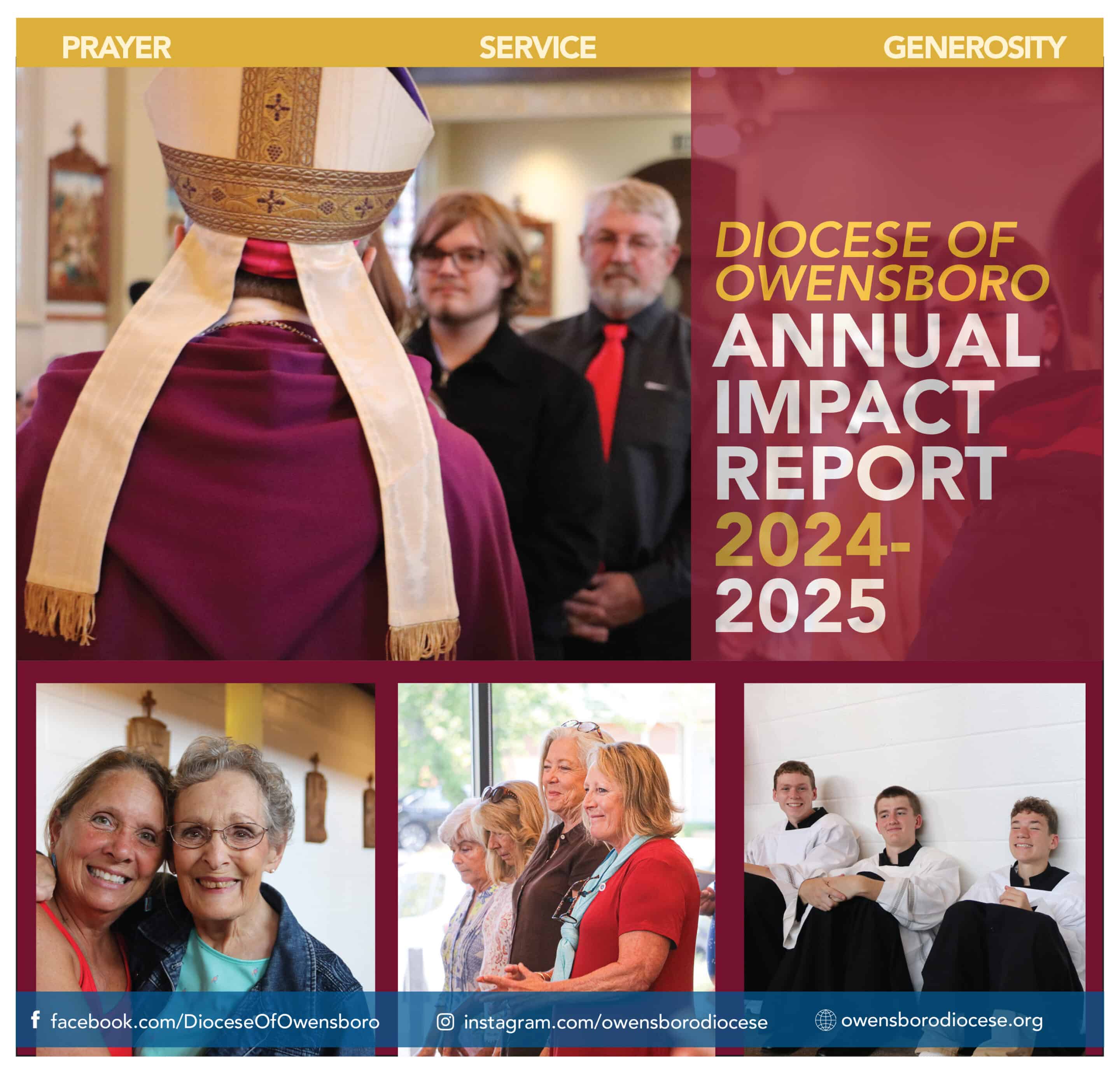From exploitation to empowerment
Bakhita Empowerment Initiative now serves western Kentuckians impacted by human trafficking
BY ELIZABETH WONG BARNSTEAD, THE WESTERN KENTUCKY CATHOLIC

Heidi Reyes-Taylor is based in Owensboro FILE PHOTO
Human trafficking happens everywhere – even in western Kentucky, according to a case manager with the Bakhita Empowerment Initiative of Catholic Charities of Louisville, Inc.
“Human trafficking is considered a form of modern slavery,” said Heidi Reyes-Taylor, the case manager for Bakhita’s newly-established Owensboro satellite location. “This is modern-day slavery, one hundred percent.”
And human trafficking is not limited to the exploitation of minors, she added.
“It’s also adults,” said Reyes-Taylor in a Jan. 10 interview with The Western Kentucky Catholic.
But Reyes-Taylor and her team with Bakhita seek to change the narrative for human trafficking survivors and “empower the person to create a sustainable life,” she said.
Bakhita has served communities in Kentucky since 2008. Besides its headquarters in Louisville, and the Owensboro satellite, it also has a satellite in Lexington.
The Owensboro office is the first of its kind in western Kentucky – which Reyes-Taylor said had been in the works for two years. She started in the position in May 2021.
“They knew there was a need in western Kentucky,” she said.
Exploitation
What defines human trafficking?
Reyes-Taylor explained that human trafficking “is the exploitation of sex and also exploitation of labor.”
Sadly, both forms of trafficking have been discovered in western Kentucky. While sex trafficking is self-explanatory, she said labor trafficking has been discovered at massage parlors, farms and restaurants, to name a few.
“We (as in the general public) aren’t as comfortable talking about labor trafficking because we consume those products,” said Reyes-Taylor.
Human trafficking does not discriminate based on who someone is, she added.
“Anyone could be a victim of human trafficking, regardless of their socio-economic bracket, regardless of age, regardless of race,” she said. “It really could happen to anyone.”
According to Polaris Project’s Kentucky Spotlight of their 2019 National Human Trafficking Hotline Statistics, 310 victims were identified, 107 traffickers were identified and 28 trafficking businesses were identified between January 2019 and July 2020.
There were a total of 136 trafficking cases – including 84 sex trafficking cases, 28 labor trafficking cases, eight sex and labor trafficking cases, and 16 “not specified” cases – within that timeframe, according to Polaris.
Unfortunately, according to the report, this data does not represent the full scope of trafficking in Kentucky.
“Lack of awareness of human trafficking or of the National Hotline can lead to significant underreporting, particularly among labor trafficking populations or by certain racial or ethnic groups,” stated the report.
Empowerment
Reyes-Taylor emphasized that unlike some other programs for human trafficking survivors, Bakhita focuses specifically on the “empowerment” aspect.
“We are not here to just fix your problems and send you back out into the world,” she said.
For instance, they refer to clients as “program participants” in order to help them emancipate themselves and start over with independence and confidence. Bakhita accompanies and walks alongside participants as they navigate the best route for their lives.
Reyes-Taylor, who currently has seven active cases, said she frequently goes over resources with participants, such as how to find a therapist or financial help.
“It’s a program participant-oriented program,” she said.
According to Bakhita’s webpage, accessed at www.bakhitaempowerment.org, “This approach restores power, which is vital to achieving self-sufficiency.”
Reyes-Taylor added that some other programs end assistance once a person becomes an adult.
“But we offer it for all ages,” she said – since any age can be impacted.
Saintly inspiration
The Bakhita Empowerment Initiative takes its name from St. Josephine Bakhita, who lived from 1869-1947 and survived kidnapping from her native Sudan as a child and subsequent enslavement for many years.
In the trauma of her experiences, St. Josephine Bakhita forgot the name her parents gave her and never remembered her original name. Her kidnappers gave her the name “Bakhita,” meaning “fortunate.”
After being bought, tortured and sold by several owners, she ultimately ended up with an Italian family where she served as nanny to the family’s daughter. She encountered Christianity when she and the daughter visited with the Canossian Sisters in Venice, which led her to enter the Catholic Church.
With her new baptismal name of Josephine, she eventually entered the Canossian novitiate and became a religious sister. She was assigned to a convent in Schio, Italy, where she became a beloved figure. Immediately after her death in February 1947, the people of Schio petitioned for her canonization, which finally took place in 2000.
Everyone’s responsibility
In October 2021, the Bakhita Empowerment Initiative presented a virtual national labor trafficking conference. It hoped to increase the capacity of organizations to address labor trafficking, address trends specific to labor trafficking, and highlight and problem-solve challenges related to labor trafficking. This was their second conference on the topic.
“Labor trafficking doesn’t always get the attention it needs,” said Reyes-Taylor.
This is just one of the many resources they offer, however. In 2022, Reyes-Taylor plans to give eight Spanish-language presentations, and several in English, to spread more awareness about human trafficking.
She said the presentations will be open to the public, “because everyone should know what’s happening in the community.”
People who should be particularly invested in this topic include, but are not limited to, “business owners, teachers, counselors, volunteers, religious groups, and people in law enforcement,” she said.
The Bakhita staff themselves are constantly doing training to stay up-to-date on the issues.
“Human trafficking is ever-evolving so we do a lot of training,” said Reyes-Taylor.
She said human trafficking is a “very macro issue that becomes a micro issue in our community.”
“If we don’t open our eyes and ears to what’s happening in our community, we become bystanders,” she said.
Learn more
Learn more about the Bakhita Empowerment Initiative at www.bakhitaempowerment.org.
What should you do if you suspect human trafficking?
If someone is in immediate danger, call 911. To connect a potential victim to services, or to request information or support, call the National Human Trafficking Hotline, operated by Polaris Project, at 1-888-3737-888 (available 24/7). Bakhita Empowerment Initiative staff are available M-F 8:30 a.m.-4:30 p.m. with some limited availability after hours and on weekends.
Presentation & Mass
On Feb. 8, 2022, feast day of St. Josephine Bakhita and the World Day of Prayer Against Human Trafficking, Bakhita Empowerment Initiative will sponsor two events to spread local awareness about human trafficking. All are welcome to attend both events.
- 11 a.m. presentation on “Human Trafficking 201: Commercial Sexual & Labor Exploitation,” at C.E. Field Center at Brescia University in Owensboro.
- 6 p.m. Mass with Bishop William F. Medley at St. Stephen Cathedral in Owensboro.
Originally printed in the February 2021 issue of The Western Kentucky Catholic.

